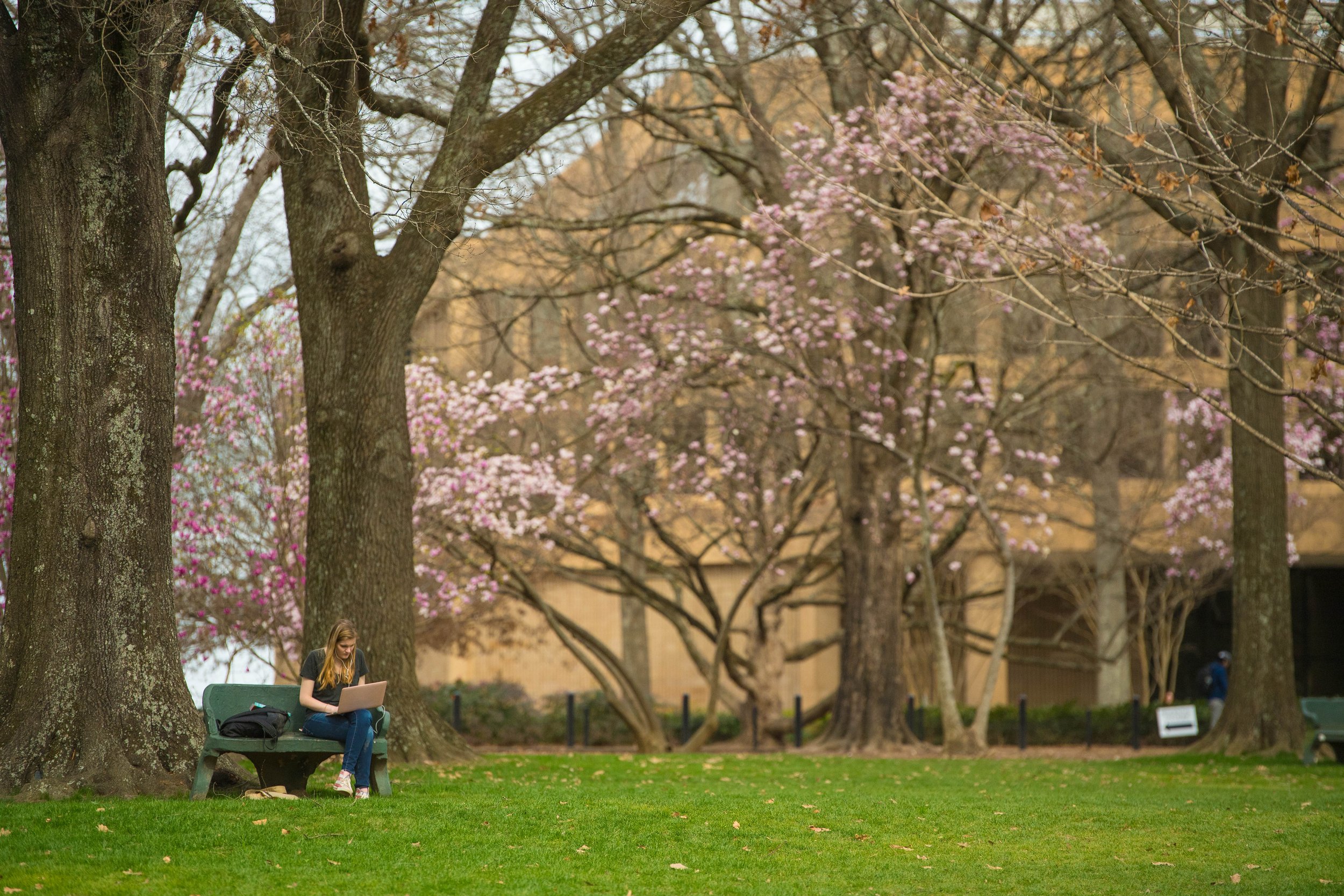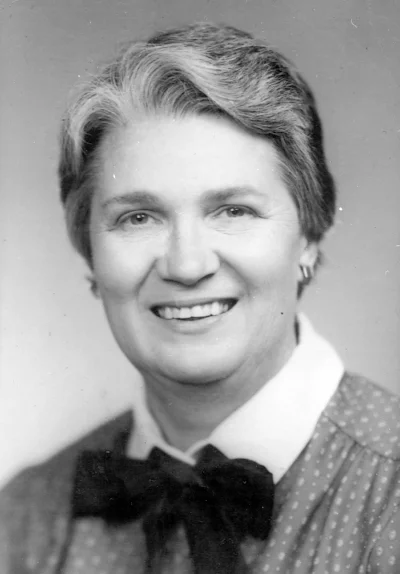
History
About the Sarah Isom Center
It all started when…
The Isom Center is part of the College of Liberal Arts
The Sarah Isom Center for Women and Gender Studies was established at The University of Mississippi in 1981 to address the changing roles and expectations of women students, faculty, and staff. The University has provided educational opportunities for women longer than any other state university in the South. When UM opened its doors to women in 1882, eleven women registered for classes; one of these became the valedictorian of her class.
In 1885, Professor Sarah McGehee Isom became the University's first female faculty member. Named in her honor, the Isom Center continues the tradition of promoting education and opportunities for women, who today constitute more than half of the UM student population.
Dr. Joanne V. Hawks served as the founding director of the Sarah Isom Center from 1981-1998. Since that time, the Center and academic program in Gender Studies have been led by faculty members across disciplines. The current director is Dr. Jaime Harker, a professor of English.
What is The Difference Between ‘Women’s Studies’ and ‘Gender Studies’?
Gender Studies has emerged out of the field of women’s studies, which was established in the early 1970’s with the revitalization of the women’s movement. “Gender Studies” examines women’s identities, roles, and statuses with an accompanying awareness of how “manhood” is defined in different cultures or contexts. To different degrees, our courses reflect these emphases, depending on the interests and expertise of the faculty who teach them. Our studies include recognition of how gender intersects with other social categories, like class, race, ethnicity, nationality, sexual orientation, age, and ability.
Sarah McGehee Isom
Sarah Isom was the first female faculty member at the University of Mississippi and the first female faculty member at a coeducational institution of higher learning in the Southeast. She was born in Oxford, Mississippi, in the early 1850's. Her parents were Dr. Thomas Dudley Isom, a physician and one of the town's leading citizens, and Sarah McGehee Isom, formerly of South Carolina.
After receiving her early education in her hometown, "Miss Sallie" attended Augusta Seminary in Staunton, Virginia, where her special talent in drama and public speaking was recognized. She later studied with James Murdock at the Philadelphia School of Expression and George Riddle and Madame Janauschek in Boston. Highly praised by her professors and others who heard her perform, she appeared destined for a career on the stage. However, she returned home instead.
In 1885, the Board of Trustees elected her to fill the Chair of Elocution at the University of Mississippi. Since no woman had previously been included in the faculty, her selection was preceded by interesting correspondence between the Board's Secretary and former Chancellor F.A.P. Barnard.
For the next twenty years, until her death, Miss Isom taught oratory to aspiring young politicians and other public figures, gaining appreciation and respect for her ability to train them to be effective readers and speakers. A striking redhead with a forceful personality, she became the subject of many tantalizing legends, some of which may actually have been true.
Joanne Varner "Jan" Hawks
1932-1998
Reprinted from the 1998 Southern Register, the official newsletter of the Center for the Study of Southern Culture
Joanne Varner "Jan" Hawks, director of the Sarah Isom Center for Women's Studies and assistant professor of history, died of heart failure on Saturday, July 4. She had served as dean of women from 1972 until she became director of the Sarah Isom Center in 1981. Hawks grew up in Georgia, was an honor graduate of Agnes Scott College, and, in 1960, came to the University of Mississippi, where she earned M.A. and Ph.D. degrees in history and served on the faculty and as an administrator except for six years when she taught at Blue Mountain College. She is survived by her husband, Paul Harvey Hawks, two sons, two daughters, a sister, and three grandchildren. Joanne Hawks will be missed by family, friends, colleagues, students, and countless others whose lives she enriched. Carolyn Ellis Staton, associate provost and associate vice chancellor for academic affairs, worked closely with Hawks in many campus activities and collaborated with her on a research project on the impact of women legislators in the South. Staton remembers Hawks as "a very supportive friend." "To most she was a role model," Staton said. "She was a champion of women and women's rights. She really helped create a good environment for women here on campus. She was the epitome of loyalty, commitment, and service-a truly wonderful person." "Jan was an important mentor to many, many women, not only in Oxford but across the state," said Brenda West, associate director of Alumni Affairs and a longtime friend of Hawks. In addition to working for the advancement of women in numerous capacities within and outside the University, Hawks made significant contributions through teaching and writing about the history of women in the South. Furthermore, she was a strong supporter of the Center for the Study of Southern Culture from its beginning. Hawks helped plan the Center's pioneering Southern Studies curriculum and taught Women in the South, the first Southern Studies course offered at the University. She developed the course as a result of her participation in "Teaching Women's Literature from a Regional Perspective," a project sponsored by the Department of Education and the Modern Language Association. The course, which was first taught in the 1979 Spring semester, became a favorite of undergraduates and graduate students in Southern Studies as well as history. With historian Sheila L. Skemp, who is currently serving as interim director of the Sarah Isom Center, Hawks organized "Sex, Race, and the Role of Women in the South," a symposium sponsored by the Center and the Department of History in 1982. Together Hawks and Skemp edited the volume of proceedings of that event. Hawks made many presentations at professional and scholarly meetings. Among these was "Mother, Servant, Saint: Historical Images of the Southern Nurse," a lecture delivered at the Barnard-Millington Symposium in 1985. The Sarah lsom Center was a sponsor of this program, and Hawks assisted with its planning and implementation. Shortly thereafter, Hawks helped develop and administer the three-year (1986-89) Ford Foundation Project in Southern Studies sponsored by the Center for the Study of Southern Culture in cooperation with the Sarah Isom Center for Women's Studies and the Afro-American Studies Program. The project, funded by a $310,000 grant from the Ford Foundation, helped the University and other institutions of higher learning in Mississippi and surrounding states enhance the teaching of Southern history and culture. Hawks was active in many organizations and served as president of the Southern Association of Women Historians, the Mississippi Association of Women Deans, and the Oxford branch of American Association of University Women. Her memberships included Phi Beta Kappa, Phi Kappa Phi, Mortar Board, Mississippi Historical Society, Mississippi Women's Political Caucus, Southern Historical Association, and the Southeastern Women's Studies Association. She was a ruling elder of the First Presbyterian Church in Oxford and a member of the board of the Historical Foundation of the Presbyterian and Reformed Churches.



